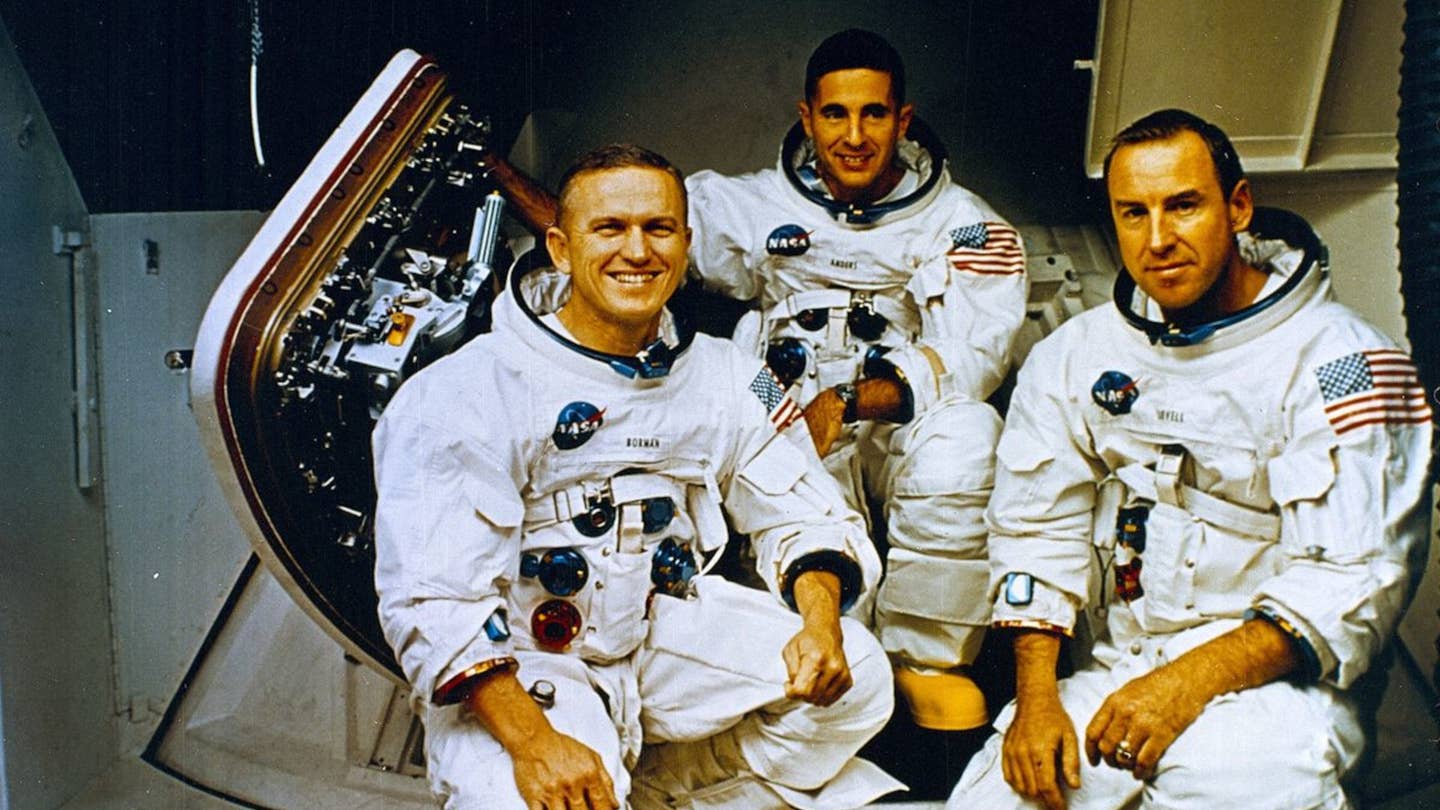55 Years Ago, Apollo 8 Astronauts Deliver Christmas Eve Message of Unity
December 24 marks the anniversary of a broadcast reading of the Book of Genesis by the mission’s crew, which reached 1 in 4 people on Earth.

Apollo 8 astronauts Frank Borman (from left), William Anders, and Jim Lovell train for their historic launch. [Courtesy: NASA]
“Thank you Apollo 8. You saved 1968.”
The telegram received by NASA astronaut Frank Borman did not name a sender. But its unidentified author may just have been right.
1968 was indeed a tumultuous year. Martin Luther King Jr. and Robert F. Kennedy were both assassinated. Protestors and police clashed at the Chicago Democratic National Convention. The Soviet Union tightened its grip on Eastern Europe during the Prague Spring, while international protests erupted over the Vietnam War.
2023 has also had its share of tumult, with major armed conflicts raging in Europe, the Middle East, Africa, and elsewhere. With the holiday season arriving, it’s perhaps as good a time as any to remember the message Borman—who died at the age of 95 last month—delivered in 1968: one of unity during a time of strife.
The Apollo 8 mission is best remembered for the famous “Earthrise” photo snapped by Borman’s crewmate, William Anders. But on Christmas Eve, Borman, Anders, and fellow NASA astronaut Jim Lovell sent a message of peace that reached 1 in 4 people on Earth.
The broadcast—which consisted of each astronaut reading a passage of the biblical creation story from the Book of Genesis—would go on to become the most-viewed TV program ever at the time. Upon returning to Earth, the three astronauts were named Time’s “Men of the Year” for 1968, in part due to the impact their words had on the world.
The Mission
The Apollo program was a bit of improvisation on the part of President John F. Kennedy, who sought to land a man on the moon before the end of the decade.
On the other side of the world, the Soviets were making headway on their Zond lunar missions, putting immense pressure on the U.S.
“The Russians’ progress with Zond influenced us,” Borman told Forbes in 2018. “There was pressure to meet the goals.”
Originally, Apollo 8 was planned as a test of the Apollo lunar module, remaining in low-Earth orbit. But delays with the module threatened to put the mission behind schedule. So, NASA decided to scrap the module and fly astronauts straight to the moon instead.
Flying during Christmastime, however, was viewed as incredibly risky. Doing so would make a failure all the more consequential in the eyes of Americans.
“Christmas and the moon were at risk if this mission failed,” Robert Kurson, author of a book on the astronauts’ journey, told Forbes. “That's why when you talk to experts or other Apollo astronauts who were around, they speak in reverential tones about Apollo 8—the risk was almost incalculable.”
Despite the gamble, Apollo 8 launched from Kennedy Space Center on December 21, 1968. But before that, Borman had some extracurricular work to do.
“We were told that on Christmas Eve we would have the largest audience that had ever listened to a human voice,” recounted Borman during the mission’s 40th anniversary celebration in 2008. “And the only instructions that we got from NASA was to do something appropriate.”
Borman reached out to his friend, U.S. Information Agency science adviser Simon Bourgin. With a little help from Bourgin, his friend, assistant to the director of the Bureau of the Budget Joe Laitin, and Laitin’s wife, Christine, an idea was hatched: to begin the broadcast with the Genesis reading.
“The first 10 verses of Genesis is [sic] the foundation of many of the world’s religions, not just the Christian religion,” said Lovell. “There are more people in other religions than the Christian religion around the world, and so this would be appropriate to that and so that’s how it came to pass.”
The Message
Borman, Anders, and Lovell traveled nearly three days to reach the moon, where they spent the next 20 hours orbiting the barren satellite 10 times.
On their fourth pass, the astronauts witnessed an earthrise in person for the first time in human history. Anders snapped a photo, which would go on to become one of the most famous images of the 20th century.
“You got a color film, Jim?” he asked Lovell. “Hand me a roll of color, quick, would you?”
Then, on the ninth pass, the crew began their Christmas Eve broadcast. The astronauts started by describing the lunar surface: “a vast, lonely, forbidding expanse of nothing,” according to Borman.
Then they turned their attention to Earth. The three men took turns reading the first 10 verses of the Book of Genesis before signing off with a message for the hundreds of millions of Earthlings sitting in front of their TVs hundreds of thousands of miles away.
About 1 billion people across 64 countries listened in to Borman’s closing words: “And from the crew of Apollo 8, we close with good night, good luck, a Merry Christmas and God bless all of you—all of you on the good Earth.”
After completing a final maneuver to reapproach Earth on Christmas Day, Lovell confirmed to mission control once and for all, “Please be informed, there is a Santa Claus.” Ken Mattingly, who was overseeing NASA communications with the astronauts, replied, “That's affirmative—you are the best ones to know.”
By the time Apollo 8 splashed down on December 27, Borman, Anders, and Lovell had become household names. They had notched a seemingly inexhaustible list of achievements: the first crewed spaceflight to leave low-Earth orbit, first human spaceflight to reach the moon, first humans to witness and photograph the far side of the moon, first launch of a crewed Saturn V rocket…the list goes on and on.
The mission paved the way for Apollo 11 and the completion of President Kennedy’s goal. It preceded the Soviet abandonment of Zond missions. But Apollo 8 was much more than a scientific and technical achievement for the U.S.
“It advanced it—in my opinion—diplomatically just as much,” Borman told Smithsonian curator and author Teasel Muir-Harmony. “It cast the country in a favorable light, at a time when there were many things that cast it in an unfavorable light.”
Kurson told Forbes: “It was a message of unity—they spoke to the entire world as one from the first lines of the first book of the Bible. It was an origin story about how we got here. It didn't talk about tribes or rivalries. It was about all of us.”
Like this story? We think you'll also like the Future of FLYING newsletter sent every Thursday afternoon. Sign up now.

Subscribe to Our Newsletter
Get the latest FLYING stories delivered directly to your inbox






